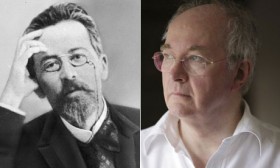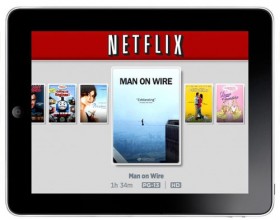The folks at MIT show you a drop of water like you’ve never seen it before. A great little outtake from the Discovery Channel program “Invisible Worlds In The Water.” This video appears in our collection of 125 Great Science Videos.
Visionaries Imagine 2011 in 1931
Back in 1931, during another period of economic malaise, The New York Times asked some big thinkers what the world will look in another 80 years. (That is, in 2011.) Some proved to be fairly prescient. Take, for example, William James Mayo (a founder of the Mayo Clinic) who said:
Contagious and infectious diseases have been largely overcome, and the average length of life of man has increased to fifty-eight years. The great causes of death in middle and later life are diseases of heart, blood vessels and kidneys, diseases of the nervous system, and cancer. The progress that is being made would suggest that within the measure of time for this forecast the average life time of civilized man would be raised to the biblical term of three-score and ten [read: 70 years of age].
That’s not a bad guess, seeing that most Westerners now have a life expectancy somewhere in the high 70s. But then, writing in the midst of the Great Depression, the industrialist Henry Ford made this prediction:
We shall go over our economic machine and redesign it, not for the purpose of making something different than what we have, but to make the present machine do what we have said it could do. After all, the only profit of life is life itself, and I believe that the coming eighty years will see us more successful in passing around the real profit of life. The newest thing in the world is the human being. And the greatest changes are to be looked for in him.
Has our economic machine really been redesigned? And has our economic system “passed around the real profit of life?” It’s hard to say an emphatic yes as we stumble into 2011. And I wouldn’t be surprised if Ford’s vision seems even more remote in 2012.
For more prophecies from 1931, please visit the Abnormal Use blog that unearthed this fine treasure…
via @eugenephoto
The Bill of Rights: Birthday Webcast Today
 To commemorate the 219th birthday of the Bill of Rights, the National Constitution Center will host today (Wednesday) a free webcast exploring the history of the U.S. Constitution’s first ten amendments. It will start with James Madison’s initial work on this list of essential freedoms, then cover the years when these provisions were seldom applied, and finally explore their rebirth in the 20th century and some contemporary debates. The 20 minute program will be viewed by six million students across the United States, and you can tune in as well for free. To take part, simply visit this site between 7:00 a.m. and 6:00 p.m. EST. And please note that the webcast will be supplemented with a live blog hosted by constitutional experts. (Photo by G. Widman for GPTMC)
To commemorate the 219th birthday of the Bill of Rights, the National Constitution Center will host today (Wednesday) a free webcast exploring the history of the U.S. Constitution’s first ten amendments. It will start with James Madison’s initial work on this list of essential freedoms, then cover the years when these provisions were seldom applied, and finally explore their rebirth in the 20th century and some contemporary debates. The 20 minute program will be viewed by six million students across the United States, and you can tune in as well for free. To take part, simply visit this site between 7:00 a.m. and 6:00 p.m. EST. And please note that the webcast will be supplemented with a live blog hosted by constitutional experts. (Photo by G. Widman for GPTMC)
Famous Authors Read Other Famous Authors
 Through December 22, the Guardian’s new Short Stories podcast (iTunes — RSS — Web Site) will present 12 well-known authors reading stories by other famous writers. So far, we have Philip Pullman reading Chekhov, Anne Enright presenting Raymond Carver’s story “Fat,” and William Boyd reading JG Ballard’s “My Dream of Flying to Wake Island.” The schedule for the nine remaining stories is right here.
Through December 22, the Guardian’s new Short Stories podcast (iTunes — RSS — Web Site) will present 12 well-known authors reading stories by other famous writers. So far, we have Philip Pullman reading Chekhov, Anne Enright presenting Raymond Carver’s story “Fat,” and William Boyd reading JG Ballard’s “My Dream of Flying to Wake Island.” The schedule for the nine remaining stories is right here.
If this podcast feels vaguely familiar, it’s perhaps because you have already encountered The New Yorker Fiction podcast (iTunes — Feed — Web Site). Here again, leading authors read short works by other great writers – Paul Theroux reads “The Gospel According to Mark” by Jorge Luis Borges, Joyce Carol Oates reads Eudora Welty’s “Where Is the Voice Coming From?,” Orhan Pamuk reads Vladimir Nabokov’s “My Russian Education,” the parade of great readings goes on.
All of these readings, plus many more, are catalogued in our collection of Free Audio Books. And there they will remain. Thanks to Stephen for the heads up on the new Guardian podcast…
Related Content:
20 Great Authors (and Actors) Read Famous Literature Out Loud
Google Teaches Your Parents Tech
Yesterday, Google launched TeachParentsTech.org, a little spin-off web site that features 50 how-to videos, all designed to answer your parents’ basic tech questions. Your father wants to know how to share a big file? Your mother is trying to figure out how to bookmark a web page? Simply head to TeachParentsTech.org, find the appropriate how-to video, send it via email, then free up time to teach yourself more heavy-duty tech.
Many of these videos showcase Google software. A coincidence? Hardly. Think of this as soft Google marketing to the Boomers.
Streaming Great Movies on Netflix
 Netflix jolted its competitors last month when it announced a new plan. Instead of receiving DVDs by mail, customers can now opt for a $7.99 plan that lets them watch an unlimited number of movies online, using their television, computer, iPad, or smartphone. Not so long ago, Netflix’s catalogue of streamable films was rather thin. But nowadays it runs deeper, and you can watch online a bevy of important cinematic works. Having struck a deal with Criterion (among others), Netflix now streams many landmark films, including classic films by Fellini, Kurosawa, Truffaut, and Bergman, and more contemporary films by Steven Soderbergh, Brian De Palma, and Wim Wenders. You can see a full list of streamable Criterion films right here. Sort through the films, find the ones you like, click the corresponding Netflix link, and then add them to your queue.
Netflix jolted its competitors last month when it announced a new plan. Instead of receiving DVDs by mail, customers can now opt for a $7.99 plan that lets them watch an unlimited number of movies online, using their television, computer, iPad, or smartphone. Not so long ago, Netflix’s catalogue of streamable films was rather thin. But nowadays it runs deeper, and you can watch online a bevy of important cinematic works. Having struck a deal with Criterion (among others), Netflix now streams many landmark films, including classic films by Fellini, Kurosawa, Truffaut, and Bergman, and more contemporary films by Steven Soderbergh, Brian De Palma, and Wim Wenders. You can see a full list of streamable Criterion films right here. Sort through the films, find the ones you like, click the corresponding Netflix link, and then add them to your queue.
If you don’t have a Netflix subscription, you can always sign up for Netflix’s one month Free Trial.
And don’t forget the 250+ quality films now listed in our collection of Free Movies Online.
The Best of NASA Space Shuttle Videos (1981–2010)
Next year, NASA plans to put an end to its 30 year old space shuttle program. Since 1981, the program has launched five space shuttles (Columbia, Challenger, Discovery, Atlantis, Endeavor) into orbit, or 132 flights in total. Here, Matt Melis, a NASA engineer, has compiled what he calls the “best of the best, state of the art” video produced by the space shuttle program. And he has stitched it into a 45 minute tribute video, called Ascent, that narrates the anatomy of a space launch, from start to finish. A great visual way to commemorate the space shuttle program, and the people who filmed it… NOTE: The video remains dark for the first nine seconds.
Glenn Gould and Leonard Bernstein Play Bach
They had a big falling out in 1962. But that was all over Brahms. When it came to Bach, things were more harmonious. So let’s rewind the videotape to 1960. Glenn Gould performs with Leonard Bernstein and the New York Philharmonic, playing (if I have this right) J. S. Bach’s Keyboard Concerto in d minor BWV 1052. Enjoy…
Related Content:
A Young Glenn Gould Plays Bach
Bernstein Breaks Down Beethoven

